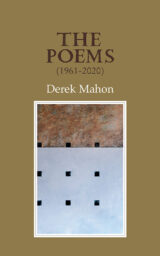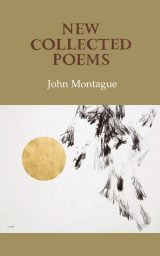'Some four years after his passing, [Dermot Healy's] five published collections are brought together in a handsome, and essential collected edition . . . In his brilliant, profound, and enduring poems, years after his sudden death, and 'with the spit of rain' on his breath, we can hear, in Collected Poems, Dermot Healy's distinctly Irish voice again. A poet not just for poets, a writer not just for writers, but a voice for everyone.' — Paul Perry, Sunday Independent
The shovels / work like oars
rowing the dead man / from this world
to the next.
Though Dermot Healy’s first collection, The Ballyconnell Colours, appeared in 1992 his first poems dated from twenty years earlier and were published and singled out for praise by Seamus Heaney.
In ‘The Off-button’ he writes, ‘the ordinary . . . I understand’ and his plainsong distilled ordinary experience — existence, resilience, moments of tenderness and absurdity.
For him the whole world was a neighbourhood and his engagement with it — its people, places, flora, fauna, weathers and oceans — prompted moments of epiphany. A true original, his lyric poems have moved, intrigued and entertained readers and listeners. Collected Poems is a harvest of almost half a century’s remarkable work — a book rich in imaginative reach and empathy.
'Healy will be remembered for his great novel A Goat’s Song, but this Collected Poems will do more than appeal to that book’s readers, and leaves its over-sized footprint in the world of contemporary Irish poetry.' — John McAuliffe, The Irish Times
Dermot Healy was known as a writer’s writer. In his own lifetime, he wrote and produced several plays, published a number of novels, with A Goat’s Song perhaps his best and most lasting, and became a part of the natural and literary north-west landscape of Ireland.
But beating always like a passionate heart throughout this body of work was the poetry, and now, four years after his passing, his five published collections are brought together in a handsome, and essential collected edition. As he says in ‘Rosses Point’, ‘The dead have a certain momentum/Sometimes it’s hard to keep up with them.’
The Ballyconnell Colours, Healy’s first collection, traces the natural world where the poet can often be found looking upward, and inward, as it happens. In his classic ‘Grounded at Annie-Come-Ashore’, he tells us we’ll ‘see the ship grounded/ike a casino at Ballincar.’
And later, the injunction is to
Mark me on the second beach
waiting for the pilot,
or on the prom at night
watching the silent gulls in a gale.
Hundreds, falling in one behind the other,
just above the water, for hours,
steadfastly.
In this case gulls, but birds of of all varieties populate Healy’s poems. He is very much the observant ornithologist of the poetry world. In his poems, you will find swallows, finches, curlews, wheatears, geese, wild ducks, and swans.
Other animals exist in the Healy poem — cats, dogs, goats amongst the buttercups, wild hollyhock, parsley, and ivy. The sea seems always to be within earshot — the Wild Atlantic, in fact. Less heir to Kavanagh, as Seamus Heaney once put, and more his own man as much as anything else, Healy’s poems do, at the same time, absorb the locally inflected idiosyncrasies of expression and humour, where ‘sickness is a cat/pulled through a sock!’
Place names have about them the totemic gust of a spell. We hear of Lough Kinale, Strandhill, Lissadell, Lough Conn, Lough Oughter, and the Sky Road.
So wedded to place can he be, that Healy finds himself ‘glued’ to where he is so that ‘before a long/journey’, he is so ‘homesick’ he can ‘hardly talk’.
The poems are weather-beaten, windswept, untamed, wild. Even when long memories are ‘reeled in’, as in ‘Nightfishing’, many poems are suffused with a silence, both named, and unnamed.
A silence, we are told in ‘October Winds’, which is the ‘hardest song to sing’. The lyrics with their tides, their moons, funerals, and migrations can often represent the chiselled watchwords for stillness, and for a sui generis coastal spiritual contemplativeness.
There’s also sorrow, regret, the ‘horrors of sobriety’, but rarely a didactic, or political utterance.
Healy’s purview is the soul, its salvation, and diminutive human presence in the natural world where ‘the horizon is an empty factory floor’. But in ‘Sunday, 16 August 1998’, he writes one of the most powerful protest poems against the past violence and conflict on this island where the only thing working ‘In Omagh/on a deserted street just after dawn’ is the traffic lights. Twenty years later, the final plea ‘for Stop, for Stop, for Stop’ is both poignant and affecting.
There’s ironic and winsome humour in his final collection The Travels of Sorrow, and so much more.
In his brilliant, profound, and enduring poems, years after his sudden death, and ‘with the spit of rain’ on his breath, we can hear, in Collected Poems, Dermot Healy’s distinctly Irish voice again.
A poet not just for poets, a writer not just for writers, but a voice for everyone.
— Paul Perry, Sunday Independent
The poet-novelist is as rare a creature as the yeti: the hyphen between the two arts is a see-saw usually tipped heavily in favour of one or the other. Since he died in 2014, Dermot Healy’s reputation has been augmented by the republication of his brilliant novels. Now his Collected Poems (Gallery, €17.50/€25) reminds us of his parallel life as a poet.
Patrick Kavanagh’s sudden flashes of lyric talk and Michael Hartnett’s poise are evident influences in his first collection The Ballyconnell Colours (1992), but Healy’s own note — intimate, lonesome, interested in the world around him and delicately observed — is also struck in neighbourly elegies like ‘The Next Room’, in which Maisie, the memorable protagonist of his memoir The Bend for Home appears,
coughing in her old room above Main Street
where she used to sit looking into three mirrors
with the radio out loud. Surrounded by powder balls,
perfumes with long stems.
Talc. Mass cards.
Healy’s gift for vivid scene-making is matched by the way his best poems drift into more meditative stanzas, as this one does:
We take the next room
with us everywhere, the unoccupied room
where they all live
whom we have met,
who lived out part of their lives
a little way along the stairs from us.
Taking death as his starting point and rationale, Healy’s poems value the ability to “catch” and somehow sustain another’s presence. In what may be the best of his five collections, What the Hammer (1998), this elegiac imperative is directed at the friends and neighbours his work consistently celebrates but also at his own condition and at the persistence of the natural world.
His fascination with birdsong surfaces in poems whose rhythms imitate their subjects’ song, blackbirds, starlings, swans, a tern, a wheatear, a gull, or the irresistible ‘Litany of the Wagtail’: “chirp of the flirt, / scurry through the blur [ . . . ] morning tuning fork, / skiff of the field. // Breast of the hailstone.”
His long poem A Fool’s Errand experiments formally: each of its 81 parts mixes short and long lines to mimic the V of geese which is the poem’s subject. Although this ambitious long poem has its admirers, its set form encouraged Healy into stragglier philosophising which crosses into the territory of ‘Four Quartets’, a high bar for any poem concerned with time and repetition.
His posthumous collection, The Travels of Sorrow, is a patchwork: slight, comic poems are engaging enough but Healy’s true power and bravery are better seen in ‘The Last of Our Name’, where his concern with cycles and repetition, which had been cast so often in terms of the natural world of migration and tides, suddenly takes on an uncomfortable psychological acuity, recording a family’s complex and interminable break-ups and reconciliations as both cyclical and unalterable: “The old war is rowing in / on the next wave”.
Healy will be remembered for his great novel A Goat’s Song, but this Collected Poems will do more than appeal to that book’s readers, and leaves its over-sized footprint in the world of contemporary Irish poetry.
— John McAuliffe,The Irish Times
Year Published: 2018
Details: 368pp
ISBN PBK: 978 1 91133 745 4
Cover: ‘The Poet’s House’ by Sean McSweeney





